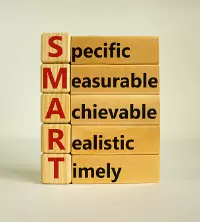
As we roll into another new year, the same refrains echo across the office, in our classrooms, at home, and everywhere you go: what are your New Year’s resolutions? New year, new you, right? What do you hope to achieve that is different from last year? What are your goals?
Yes, the same song and dance at the beginning of every year can get tiring. Yet, there’s a particular benefit to this societal ritual that everyone goes through; it’s a chance at self-reflection. Not only that, but goal setting is a powerful tool for those wishing to overcome stress, anxiety and depression. However, such is only possible if goals are manageable and expectations are appropriately set.
So, before you decide on your New Year’s resolutions, take a moment to think smart about what’s manageable for you and some reasonable heights you can reach. This might finally be the year you can cross a few of those resolutions off your list!
Why Set Goals?
There’s plenty to be gained from setting goals, even if not all of those goals come to fruition. In fact, just the act of planning and forward-thinking contributes to a healthier mental outlook.
By setting specific goals, you create a roadmap to success for yourself. The idea is to establish, in clear terms, the things you wish to achieve, improve on or accomplish. These can be personal health goals, like losing a specified amount of weight, or more career-oriented, like securing a promotion.
No matter the amount or types of goals you set, you benefit from the direction, motivation, and focus a goal provides:
- Increased Focus – If keeping your focus on tasks is something you find difficult, goal setting can help. Short-term and long-term goals give you something to focus on, helping you pay attention to the task at hand.
- Better Performance – In addition to increased focus, having a goal allows you to place all your energy and skills into one assignment. In turn, you might see better results and improved performance as a result of your actions.
- Greater Enjoyment & Satisfaction – If you have a goal you’re always working toward, it will be easier to find the fun and enjoyment of the process. As you begin achieving more success, you draw greater satisfaction from your accomplishments and improvement.
- Reduced Stress – If you have a clear, thought-out plan of action for achieving your goals, the stress of reaching them lessens. Ultimately, breaking goals into manageable steps helps you worry less and feel better about the incremental process you make.
- Worthwhile Results – If a focused effort towards improvement has borne results, you only have yourself to thank. Completing goals can have positive knockback effects on your life, impacting your overall physical and emotional well-being, in addition to any self-improvement you achieve.
Think SMART
Not sure where to start? Don’t sweat it! Goal setting and New Year’s resolutions can be as simple or as aspirational as you prefer. However, there is some use to carefully selecting the goals you wish to achieve. It’s all about setting realistic expectations for yourself and maximizing your chance at growth and success. In fact, there’s a helpful framework for creating reasonable, achievable goals: SMART goals. SMART goals establish the unique qualities that make for a clear, trackable, and obtainable goal. For example, the SMART acronym stands for:

- Specific – Don’t be too broad with any goal you select! It’s easy to say your goal is to “lose weight,” but how can you track such a goal or know when you’ve completed it? Be specific and instead work towards goals like “lose 20 pounds” or “increase my lifting weight by 20%.”
- Measurable – In addition to goals being specific, you’ll want to pick goals with progress that are measurable. Whether it’s you aiming to reach a certain number or percentage or racing to meet a deadline, you need some way in which you can clearly distinguish your level of progress, success or failure.
- Achievable – What’s the point of setting a lofty goal if you cannot conceivably reach it? For example, learning to play piano is possible but something too challenging to do in any short span of time. Instead, a more reasonable and achievable goal would be to “practice piano 30 minutes a day” and work toward larger, long-term goals.
- Realistic – Not only must your goal be achievable, but it must also be realistic. We’ve already mentioned learning to play the piano: is that something you think you can realistically complete within a month? Two months? Likely not! Learning to play piano is possible, but establishing realistic milestones for you to reach along the way is the key to success.
- Time-Bound – All your goals should have a clear end date in mind. While these “deadlines” don’t need to be set in stone, they offer a sense of urgency and motivation that’s sometimes necessary for accomplishing a goal. Without deadlines or timeframes, a goal is much easier to neglect and eventually forget.
Need Help Planning Your Resolutions?
Or, perhaps you have a resolution to improve your mental health? No matter your concerns or thoughts on the year ahead, talking with a trained counselor can help. Discuss goal setting and your plans for the New Year in a counseling session with Chapin & Russell Associates! We’ve helped countless clients in Peoria, Dunlap, Washington, and across Central Illinois achieve healthier mental health outlooks. Learn more about our general counseling services by calling
309-681-5850.


